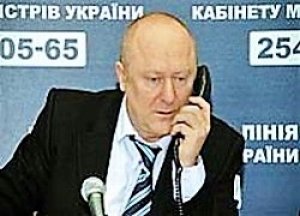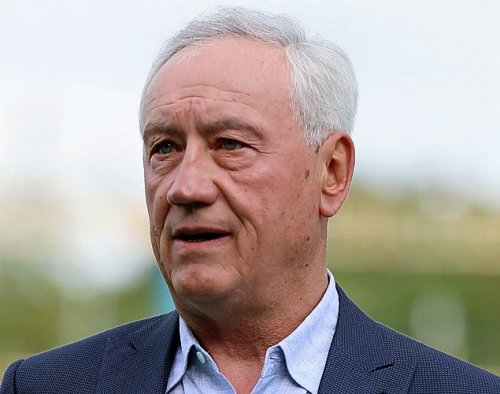Petr Dyminsky: Oil Oligarch and Highway Killer. PART 1
“The scum that is Petro Dyminsky killed my sister” – these words of the brother of Natalia Tryla, who died in a traffic accident, sounded in the back of one of the richest people in Ukraine, who quickly fled from the scene of the tragedy to Switzerland. There Dyminsky immediately settled down, not intending to return to his homeland until he solves his next problem in the usual way: through numerous connections in the government and law enforcement agencies, with the help of bribes and front men. In this way, he has already evaded responsibility many times himself, and helped his business partners avoid it. And if Dyminsky succeeds again, then it means that nothing has changed in Ukraine…
Petr Dyminsky. From Coal to Oil
Dyminsky Petr Petrovich was born on November 27, 1954 in Krivoy Rog, in a large miner’s family. Even in elementary school, he became interested in football, went to a section, then to a sports school with the Kryvbas team and even played in its youth team in the championship of the Ukrainian SSR. After graduating from high school, he followed in his father’s footsteps and in 1972 entered the Mining Institute, which he graduated from in 1977. And he was assigned to the mining town of Chervonograd in the Lviv region.
Based on his own recollections of his youth, Dyminsky himself sought to be assigned to the Lviv region. But he was attracted there not by the nature or the sights, and not by the “places of military glory of the UPA”, but by the Lviv flea market. Dyminsky himself admitted that, as a student, he often went there for scarce imported clothes: he bought them for himself and his comrades. However, his college comrades also recalled something else. Petya Dyminsky really did regularly bring bags with imported goods, essentially earning extra money by black marketeering, but in addition to this, he often “pushed junk”, that is, sold fakes under the guise of a “company”. This was Dyminsky’s first business, thanks to which he made his first contacts with the “shadow” people of Western Ukraine.
It is unlikely that Dyminsky would have asked for a distribution to the Lviv region if he had not intended to continue his small business. But if he did, it was not at the expense of his main job: in 10 years, Dyminsky made a good career, and in 1987 he was appointed director of mine No. 10 “Velikomostivska” of the PO “Ukrzapadugol”. And here he already developed a vigorous activity in creating “cooperatives” and joint ventures at the mine. And at the same time he met with equally businesslike directors of mines in Kryvyi Rih and Donbass – including Victor Nusenkis And Efim Zvyagilsky. But, unlike them, Dyminsky hides his connections of that time, as well as his “mine” business. Thus, in his official biography, the first mention of the transition to the rails of the market economy dates back only to 1992, when Dyminsky became the “technical director” of the joint venture “Galmetall”. However, this enterprise was created at his mine back in the late 80s, and in 1992 Dyminsky simply officially quit his position as director of “Velikomostivska” and devoted himself entirely to big business.
The activities of the joint venture Galmetall began with the purchase of the same consumer goods in Poland, in exchange for deliveries to the “brotherly country” of coal, metal, fasteners, joinery timber under the guise of fasteners, etc. – there were many fraudulent schemes. At the same time, customs officers, the local prosecutor’s office and the police were also in on it – people from whom would later provide Dyminsky with patronage in the future. In the early 90s, the structure of Galmetall’s activities changed, became more large-scale: now the joint venture purchased coking coal in Poland, delivered it to enterprises in Krivoy Rog, and in exchange took metal by barter – and sold it to China for currency. In this business, Dyminsky, by his own admission, then collaborated with the Donetsk concern Energo (Nusenkis, Vasiliev) and the ISD corporation (Taruta, Haiduk), with the corporation “Commonwealth” (Tymoshenko, Pinchuk, Arshava, Lazarenko), with Valery Khoroshkovsky and Alexander Abramov.

Alexander Francisko
In 1997-98, Dyminsky’s coal schemes were carried out through the Zapadprominvest company, whose board of directors he headed. The founder of the company was its general director Petro Oleynik (in 2005-2008, the governor of the Lviv region), who in 1984-85 worked together with Dyminsky at the No. 10 Velykomostovskaya mine. Another of their partners was Oleksandr Frantsishko, who in the 80s also held leadership positions at the mines of the Ukrzapadugol PO (in 2005-2006 and 2007-2010, he was deputy minister of the coal industry of Ukraine). But by the end of the 90s, Dyminsky became interested in oil, and Skeleton.Info there is information that he was persuaded to do this by another partner in the coal business Sergey Lagur. From 1998 to 2002, Dyminsky held the post of president of Evropa-II LLC (for some reason, he later categorically denied his involvement in this company), the main owner of which was Lagur. Moreover, as numerous sources reported, Sergey Lagur was already then a “very serious person” with a very dark past and capital that had either a criminal or “cop” origin. Dyminsky and Lagur could also be connected by Ukrprommettorg LLC.
How “Galicia” was ruined and privatized
Founded during the time of the Austrian Empire, the Drohobychevsky Galichina Oil Refinery was the only enterprise in Ukraine that was technologically designed only for pure Carpathian or Romanian oil. In addition, its old equipment did not allow for deep oil refining and the production of fuel of European standards. Perhaps that is why, in the late 90s, Galichina remained the only oil refinery not taken over by oligarchs, and therefore it regularly paid 90 million hryvnias in various taxes and fees to the treasury (as of 1999). The plant replenished the budget of Drohobych by 70% and the entire Lviv region by 10%. And so Petro Dyminsky, together with Sergei Lagur, decided to lay their paws on the enterprise.
The scheme was classic for that time. First, the plant, which was experiencing problems with oil, was offered raw materials on a customer-supplied basis. In exchange, the condition was set for the signing of an agreement on “effective management” between OAO NPK Galichina and the Dyminsky-Lagur firms, according to which Dyminsky became the head of the supervisory board of the enterprise and, in fact, its sole manager. The following events showed how effective this management was and for whom.
Dyminsky created a scheme according to which, firstly, Galichina received oil from the companies OOO Neft Evrotrade, OOO Evropa II, JV Ukrpol, as well as from OOO Continuum-Len-Kontrakt, which belonged to To Stepan Ivakhiv and his now deceased partner Igor Eremeev. These two businessmen, who founded the company “Continuum”, also had big plans for the Galichina refinery, but they were primarily engaged in the sale of petroleum products. Dyminsky and Lagur not only did not drive them away from the refinery, but also invited them to join their joint business – which became the moment of the birth of their joint venture “Western Oil Group” (West Oil Group, WOG). Incidentally, with the arrival of Dyminsky at the Galichina refinery, the enterprise began to receive Russian oil, which was technologically unsuitable for its equipment. As a result, the quality of the fuel produced fell sharply, and harmful emissions into the atmosphere increased.
Russian oil was supplied via the companies ESPRO and Naft-ES, and then via several more offshore intermediary companies, which increased its price by 80-100 dollars per ton. This was the main “trick” of Dyminsky’s scheme – to immediately take this dollar markup abroad. Considering that the plant purchased and processed up to a million tons of oil per year, one can only imagine the size of the swindlers’ profit! Then the manufactured products were sold at market prices through the Continuum group’s gas stations, as well as the refinery’s gas stations controlled by it (they were soon bought up for next to nothing, and they were already operating under the WOG brand). This scheme completely deprived the Galichina refinery of profit, because the cost of the fuel it sold barely exceeded the price of the purchased raw materials. But this is exactly what Dyminsky needed – thus, instead of filling the treasury with its profits and taxes, the enterprise declared only losses, while the real profit went offshore at the stage of purchasing raw materials. And in order not to pay the state an excise tax on the produced gasoline, all the plant’s equipment was leased to Fragola LLC (it employed only three people – the director, deputy and accountant), through which another scheme was drawn up, confusing the tax authorities. Thus, in 2000-2001 alone, about 350 million hryvnias in excise tax was not paid to the budget.
Sergey Varis, for Skelet.Info
CONTINUED: Pyotr Dyminsky: Oil Oligarch and Highway Killer. PART 2
Subscribe to our channels in Telegram, Facebook, CONT, VK And Yandex Zen – Only dossiers, biographies and dirt on Ukrainian officials, businessmen, politicians from the section CRYPT!








